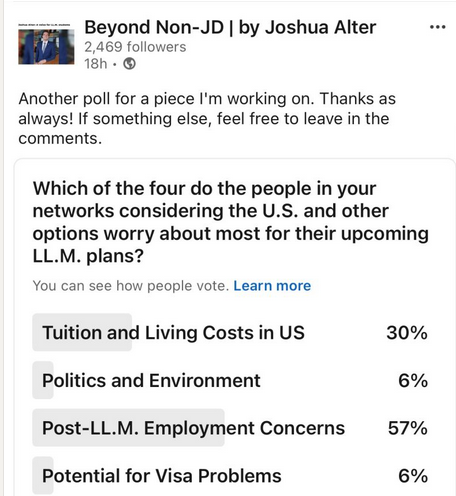For the past decade, I have taught LL.B. students weighing the United States against other options for LL.M. programs.
I have long paid attention to what was happening in the U.S., and around the world, as my students finalized their decisions and weighed their T10 and T20 admissions against key LL.M. programs and key partner school competition in other jurisdictions.
Globally open students always have LL.M. options
Even when news in the U.S. is positive, I have students who choose LL.M. programs in other jurisdictions. And I’ve never taken it personally. Even though “American Law Schools” is in my course name.
Maybe a school in another jurisdiction was the true dream school or another destination was the top choice for study abroad.
Maybe they received a fully funded LL.M. to attend a partner school outside the U.S.
Maybe the costs at their top choices in the U.S. were just too high compared with equally great opportunities in other common law jurisdictions.
Maybe perceptions on safety and realities of distance meant leading law schools closer to home were preferred by family.
The point is that not every prospective LL.M. student will choose the U.S. even when everything is going well.
2025-26 academic year
So it’s not a surprise that given current geopolitical issues, domestic tensions and a lot of uncertainty, more LEALSers and other prospective students who applied globally are taking a closer look at the U.S. as they finalize their plans. They are following the news and current developments as they make their decisions.
While bar exam pathways seem just as (if not more) attractive, currency fluctuations, questions surrounding H-1B visas and an uncertain job market are just a few of the tension points as lawyers from around the world attempt to time their LL.M. year to perfection.
While it may still be a great time for others to study in the U.S. (two LEALSers just shared how excited they are to finalize their plans at great U.S. law schools for 2025-26), you will want to make sure that 2025-26 is the right year for your U.S. LL.M. degree.
In fact, there are some prospects in particular who will probably consider 2025-26 a really great year to study in a U.S. LL.M. program.
Is 2025-26 that much different?
While I cannot speak to trends across higher education degrees and industries, I have spent my career working with international LL.M. students. And foreign-educated law school graduates who enroll in residential LL.M. programs consistently talk about two main factors: eligibility for state bar exams such as in New York and/or paths to post-LL.M. jobs in the U.S.
While there are not too many big differences when it comes to a bar exam, being on a student visa plays a major role in the post-LL.M. job search in the U.S. Which is where I see the most concern for 2025-26.
Students I teach have not really changed their minds about the U.S. for 2025-26. If that was the No. 1 choice last year, it generally remains the same this year. If it was one of the options last year, the same is likely still true.
My students are generally looking at eligibility to sit for the New York Bar Exam and to stand out with an elite university brand and network in competitive job markets abroad. And I was curious whether traditional issues (costs and jobs) or more current issues (political environment and visa news) were more concerning.
Beyond Non-JD respondents overwhelmingly shared a similar sentiment to my students and people in my networks. Overall costs and the job market for LL.M. graduates were more important than the political climate and current events.

To be fair, my network is heavily skewed towards foreign law school students and graduates seeking corporate law and business jobs.
Anecdotally, some people specifically interested in certain areas of law or from specific jurisdictions are cooling on the U.S.
But generally? I think good admissions offers and/or scholarships, combined with a more stable job market, would mean a relatively similar year for LL.M. programs from a financial perspective.
Defer or reapply?
While each school has its own admissions procedures, you may want to inquire into deferring or reapplying if you feel that 2025-26 would not be a good year for you to take on the LL.M. degree.
Message boards are a great place to see some of the discussions on both, primarily for J.D. prospects weighing their important decisions.
Who may want to consider deferring or reapplying the following cycle? My students have heard me say that “U.S. LL.M. programs are not going anywhere.” Although schools need to ensure they bring in LL.M. classes and meet any financial targets, that does not mean any specific year needs to be the year that you go.
2025-26 will likely be a high-risk, high-reward year for those who come on student visas and who define success as good post-LL.M. jobs in the U.S., and that is true most years.
While hard to predict the future, some people may want to let politics play out and see what happens with H-1Bs, OPT, and other ways for international students to work and stay in the U.S. before making the commitment.
Communication with your top choices and how your own application cycle played out will play a role. Great scholarship at the school you really want to go to? It may be hard if you’re unable to defer.
But if you’re looking at spending a lot of money but not thrilled with your options? Another year of experience and reapplying may be a blessing in disguise. And you’ll get to make your 2026-27 decision armed with a lot more information with potential changes in the U.S.
Conclusion
U.S. law schools will welcome wonderful LL.M. students into their programs in 2025-26.
Rather than say whether 2025-26 will be a good year or bad year for everyone to study in an LL.M. program, you’ll need to think even more about your own goals, your own cycle and your own focus areas.
Making the best decision for you may mean going through the visa process to prepare for your U.S. LL.M. degree. It may mean attending school in another jurisdiction. Or it may mean waiting a year to see what happens before deciding.
Ultimately, make the best decision for you.


